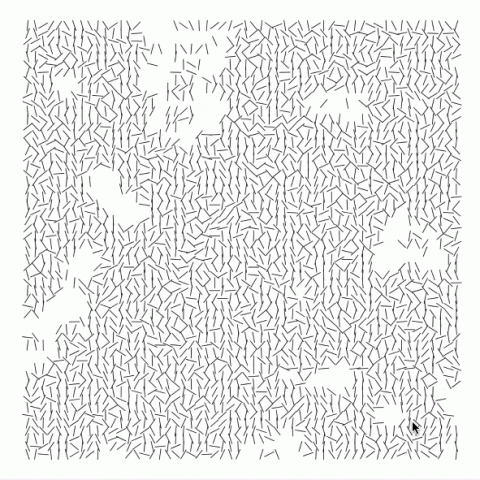
// Starter Code for "Embedded Iteration + Randomness" var boolDoRefresh; function setup() { createCanvas(744, 744); background(255,255,255) boolDoRefresh = true; } function findpointcircle(i,j) { var margin=48 var square=12 var r = 8 // console.log(i,j) var midx=margin+((j*square)-(0.5*square)) var midy=margin+((i*square)-(0.5*square)) var slope = map(i*j, 0,25,0,10) var deg = randomGaussian(2*PI, 0.7); var x = midx+(r*sin(deg)) var y= midy+(r*cos(deg)) //(x – h)2 + (y – k)2 = r2 var endx = midx+(r*sin(deg+PI)) var endy = midy+(r*cos(deg+PI)) return [x, y, endx, endy] } function draw() { if (boolDoRefresh) { setup() noiseSeed(); var size=56 for (i=0; i<size;i++) { for (j=0; j<size;j++) { // noiseDetail(5,0.5); var blank = noise(i*0.1+10,j*0.1) var blank2 = noise(i*3+10,j*0.1) // console.log(i*0.02+10, j*0.02, blank) strokeWeight(1); var points =findpointcircle(i,j) if (blank>0.32) { line(points[0], points[1], points[2], points[3]) } else if (blank<=0.25 &&blank2<=0.5) { line(points[0], points[1], points[2], points[3]) } } } boolDoRefresh = false; } } function mousePressed() { boolDoRefresh = true; } |
Observations:
1. The artwork is square.
2. The artwork consists of many short black lines, on a white background.
3. The lines all have the same length
4. It is 56 x 56 lines (I think)
5. The lines have varying random degrees of rotation
6. There is like 3-5% chance of no line drawn
7. The lines don't take up their own space, there is a lot of overlap
8. some of the artworks are "mostly vertical" lines and some are "mostly horizontal" lines
9. There are random blobs of blankness
10. There is a small gradation towards blankness
Reflection:
Gaussian distribution and perlin noise have been words I've been hearing around for a long time now, but have never understood. What was especially hard about this was getting the blanks in the Vera drawings correct. At the end, I still feel like my blanks are shaped a bit too round...to be honest, I still don't really understand how the noise distributions are made. I spent a lot of time inserting random numbers as my "noise scale." I understand the general concept of noise, but will need to technically understand it more. Edit: After posting this, I actually realized that I had forgotten to make sure that the mean angle of the lines changes--every time, the lines in my piece are mostly vertical. However it was satisfying to see how Gaussian distributions are utilized.